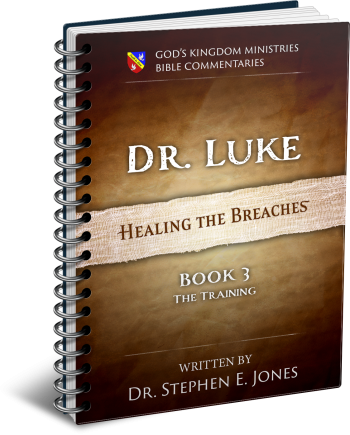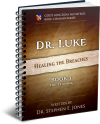Latest Posts
View the latest posts in an easy-to-read list format, with filtering options.

This book covers Luke 7-9, expounding on the main teachings of Jesus as He trained His disciples. It climaxes with His Transfiguration, which is a prophetic picture of the manifestation of the Sons of God at the end of the Age.
Category - Bible Commentaries

Jesus was not offended when John sent disciples to ask, “Are You the Expected One?” It happened that when those disciples arrived, they had opportunity to witness many people healed, as we read in Luke 7:21,
21 At that very time He cured many people of diseases and afflictions and evil spirits; and He granted sight to many who were blind.
John’s disciples became Jesus’ witnesses. Jesus did not need to answer their question, for He let the Holy Spirit bear witness to Him. In John 5:31, 32 Jesus says,
31 If I alone bear witness of Myself, My testimony is not true. 32 There is another who bears witness of Me, and I know that the testimony which He bears of Me is true.
He was referring to John’s witness at His baptism, but the principle holds true in Luke 7:21 as well, where the Spirit bore witness by the miracles of healing. Jesus then sent John’s disciples back with the report of what they had seen and heard.
Luke 7:24-28 continues,
24 And when the messengers of John had left, He began to speak to the multitudes about John, “What did you go out into the wilderness to look at? A reed shaken by the wind?”
John was strong in faith, in spite of the appearance of wavering. He was no “reed” that might be shaken by adversity. He had heard from God when He bore witness to Jesus at His baptism, saying, “Behold, the Lamb of God who takes away the sin of the world” (John 1:29). Yet because he had sent disciples to inquire in this manner, Jesus found it necessary to assure the people that John’s faith was still strong.
Many of us, having heard the voice of God and having received revelation from the Spirit, have questioned our revelation when it was tested by time and adversity. In such times, we too go to Jesus and seek confirmation of our revelation. Are we reeds shaken in the wind? Certainly, the wind blows to test every revelation and to distinguish those who have heard the words of a prophet from those who have heard God through the prophet. Those with true faith do not doubt God, but doubt their ability to hear God. Moreover, they question their ability to understand and apply what they have heard.
25 “But what did you go out to see? A man dressed in soft clothing? Behold, those who are splendidly clothed and live in luxury are found in royal palaces.”
This was a distinct reference to King Herod, whose life of luxury was well-known. Perhaps Jesus was hinting that soon Herod would kill John.
Jesus continued,
26 “But what did you go out to see? A prophet? Yes, I say to you, and one who is more than a prophet. 27 This is one about whom it is written [in Malachi 3:1], ‘Behold, I send My messenger before Your face, who will prepare Your way before You.’ 28 I say to you, among those born of women, there is no one greater than John; yet he who is least in the kingdom of God is greater than he.”
Even as John had borne witness of Jesus, so also Jesus now bears witness of John, affirming his calling as a prophet and as the “messenger” in Mal. 3:1. Hence, John came “in the spirit and power of Elijah” (Luke 1:17) but also to prepare the way for the Messiah. Elijah’s focus was to bring about repentance. The “messenger” was to prepare the way for the Messiah—another messenger who was to “suddenly come to His temple” as a “messenger of the (new) covenant” (Mal. 3:1).
Malachi blends his prophecy of the two messengers, so as to make them almost indistinguishable, much like other prophets treat the two Jerusalems.
Mal. 3:2, 3 also says,
2 But who can endure the day of his coming? And who can stand when He appears? For He is like a refiner’s [tsaraph] fire and like fullers’ soap. 3 And He will sit as a smelter and purifier of silver, and He will purify the sons of Levi and refine [tsaraph] them like gold and silver, so that they may present to the Lord offerings in righteousness.
Malachi’s prophecy draws from the fact that Elijah had gone to Zarephath, “refinement,” where he hid during the time of the famine (1 Kings 17:9). Zarephath is from tsaraph, “to refine.” Malachi’s revelation interprets this as a prophetic event indicating that the ministry of Elijah (during the famine) would refine the sons of Levi.
John the Baptist defers to the Messiah and His baptism of fire in Matt. 3:11, but yet it was Elijah himself who had gone to Zarephath, where they refined metals at the smelting furnace. Elijah was the forerunner, then, whose trip to Zarephath prophesied of the baptism of fire that was to purify the sons of Levi. This was a veiled reference to the transformation from Levi to Melchizedek by the indwelling presence of the Holy Spirit.
Hence, John the Baptist was more than “Elijah,” preparing the way for Elisha. He was also the one prophesied in Mal. 3:1, who would prepare the way for the Messiah and the Holy Spirit’s baptism of fire. Luke 7:28 testifies that there was no one greater than John. This was an astounding testimony of John’s integrity and calling. But what does it mean?
Luke did not explain this further, but Matt. 11:12-19 adds more details,
12 And from the days of John the Baptist until now the kingdom of heaven suffers violence, and violent men take it by force.
John was about to suffer violence by his death at the hands of King Herod. The kingdom of heaven was in John, Jesus, and their disciples, for they were the ones truly called to rule the kingdom. However, the beast nations had been given dominion on account of the sins of Israel and Judah, and even the religious leaders seemed to manifest the heart of the beast, rather than the heart of God.
Both the political and religious leaders tended to obtain their positions by violence and force, rather than peaceably by the anointing of God. When competition arose, they were executed. And so both John and Jesus suffered violence. John was soon to be executed by the political leader, King Herod, while Jesus was later to be crucified by the religious leaders of the temple (John 19:15-18; Acts 7:52).
Matthew continues,
13 For all the prophets and the Law prophesied until John. 14 And if you care to accept it, he himself is Elijah, who was to come. 15 He who has ears to hear, let him hear.
Here Jesus linked John to Elijah in the context of the violent men who had taken the kingdom by force. Jesus’ statement in verse 15 indicates that in linking John to Elijah, more was being implied than what was actually stated.
Elijah himself had been opposed by Ahab and finally threatened by Jezebel (1 Kings 19:2). This is what caused Elijah to flee to Mount Horeb, virtually ending his ministry. So also John would be executed by Herod, ending his ministry. Jesus implied that He knew John was soon to come to a violent end, but refrained from saying so directly, because saying so plainly would have been dangerous. Herod’s spies were everywhere.
As I wrote earlier, this was recorded by Matthew, but Luke chose to omit it.
Luke’s account then continues in Luke 7:29,
29 And when all the people and the tax-gatherers heard this, they acknowledged God’s justice, having been baptized with the baptism of John. 30 But the Pharisees and the lawyers rejected God’s purpose for themselves, not having been baptized by John.
In other words, the common people in the audience acknowledged the truth of Jesus’ statement, not only about John himself but also about the violent men who had taken the kingdom by force. Luke then continues,
31 “To what then shall I compare the men of this generation, and what they are like? 32 They are like children who sit in the market place and call to one another; and they say, ‘We played the flute for you, and you did not dance; we sang a dirge, and you did not weep.’ 33 For John the Baptist has come eating no bread and drinking no wine, and you say, ‘He has a demon!’ 34 The Son of Man has come eating and drinking; and you say, ‘Behold, a gluttonous man, and a drunkard, a friend of tax-gatherers and sinners!’”
The forerunner of the Messiah preached both good news and bad, but the people did not respond to His message. Many individuals did respond, of course, but the religious leaders did not, and so the nation did not turn back to God. Further, John did much fasting, but these leaders only attributed it to demon possession. Christ came without fasting twice a week, as so many religious leaders did, and so they called Him a glutton and drunkard.
When men oppose others, it makes little difference what they do that is good and right. Their motives are maligned in everything they do. That is how virtually all politics is done even today. One party will never give credit to another party for any good that they may do, because they are competitors to the end.
Jesus said in Luke 7:35,
35 “Yet wisdom is vindicated [dikaioo, “justified”] by all her children.”
Matt. 11:19 reads, “Yet wisdom is vindicated by her deeds.”
Wisdom is from the Greek word sophia. Jesus was not speaking of the philosophical wisdom of the Greeks, but rather the wisdom of God as defined in Deut. 4:6,
6 So keep and do them [the laws, statutes and judgments], for that is your wisdom and your understanding in the sight of the peoples who will hear all these statutes and say, “Surely this great nation is a wise and understanding people.”
In this case the wisdom is the law, which is vindicated by “deeds” done by “her children.” The implication is that those who responded to John’s message were obeying the law, which called on men to repent for their sin. These were the children of the law, and by extension the children of the Lawgiver. Those who refused John’s baptism were disobeying the law and were therefore neither “her children” nor the children of God.
Wisdom is justified by actual performance. The meaning of the Greek word dikaioo is given in Gesenius Lexicon as: “to show, exhibit, evince, one to be righteous.” In other words, the wisdom, as set forth in the laws, statutes, and judgments of the law, are expressed, manifested, and proven by those who actually live according to its principles.